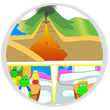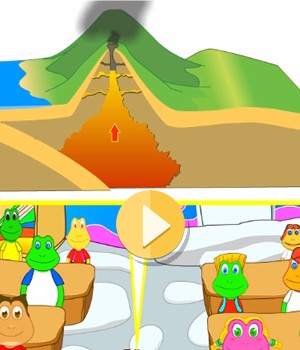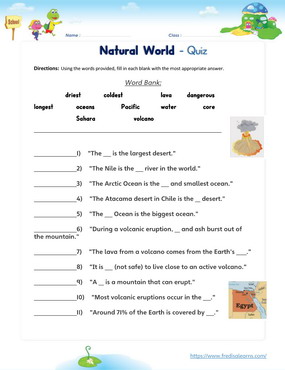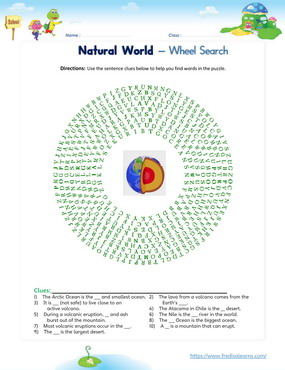Unit 2: Natural World
Objectives:
- This English lesson teaches ESL kids vocabulary related to the natural world.
- Students will learn how to use comparatives and superlatives to describe things in the natural world.
- After this lesson, kids should be able to compare and contrast things.
Main Lesson Materials & Study Steps
1st –This cartoon animated video features a short dialogue, followed by vocabulary and sentence breakdown. It is essential for introducing the words, phrases, grammar, spelling and sentences of the lesson in context. Watch repeatedly to master the content. The video plays on any device.
2nd – Then the student plays this fun game after watching the video, to practice the contents of the lesson. The game reviews key vocabulary, grammar and sentences from the lessons. This game can be played on any device.
3rd – Finally the learner takes this test of the unit. The score of this test is captured in the LMS and gives educators an idea of how well their learner is doing. The test opens on any device – mobile & PC.
Worksheets for the Unit
The worksheets below are useful for offline and classroom activities. These printable exercises directly correlate with the above lesson 'Natural World'. Every worksheet comes with an answer sheet on the second page for educators.
Already a Member?
Not a member yet?
Lesson Story:
Ms. Ann’s topic for the day is volcanoes. She teaches the students what a volcano is and about eruptions. Freddie asks if volcanic eruptions are dangerous. Ms. Ann tells them the story of a mountain in Italy that erupted with deadly consequences. Frightened by the new knowledge, the kids wonder whether this might happen to them. Ms. Ann promptly explains that most volcanic eruptions actually take place in the oceans.
Vocabulary:
| volcano |
| lava |
| Earth's core |
| mountain |
| erupt |
| dangerous |
| ocean |
| ash |
| 71% or 71 percent = 71/100 |
| river |
Comparatives & superlatives (use some objects to show)
| long | longer | longest |
| big | bigger | biggest |
| small | smaller | smallest |
| colder | colder | coldest |
| hot | hotter | hottest |
| dry | drier | driest |
Sentences with superlatives
| What is the biggest ocean? |
| The Pacific Ocean is the biggest. |
| What is the longest river? |
| The Nile is the longest river. |
| What is the driest desert? |
| The Atacama Desert in Chile is the driest desert. |
| What is the coldest ocean? |
| The Arctic Ocean is the coldest. It is also the smallest ocean. |
This lesson is part of the Level 6 English course.
Welcome to the exciting world of nature! In this English lesson, you will learn about the amazing things that exist in the natural world. From towering mountains to vast oceans, the natural world is full of wonders waiting to be explored.
Through this lesson, you will not only learn essential vocabulary related to the natural world, but you will also learn how to compare and contrast things using comparatives and superlatives. Imagine being able to describe the tallest mountain or the largest ocean in the world with ease!
Learning about the natural world will not only improve your English language skills but also help you to appreciate and understand the world around you. You will learn to appreciate the beauty of nature and its importance to our planet.
So get ready to explore the natural world and learn how to describe it in English. By the end of this lesson, you will have the tools you need to compare and contrast natural phenomena and impress your friends and family with your newfound knowledge.














